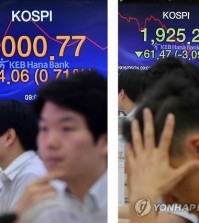- California Assembly OKs highest minimum wage in nation
- S. Korea unveils first graphic cigarette warnings
- US joins with South Korea, Japan in bid to deter North Korea
- LPGA golfer Chun In-gee finally back in action
- S. Korea won’t be top seed in final World Cup qualification round
- US men’s soccer misses 2nd straight Olympics
- US back on track in qualifying with 4-0 win over Guatemala
- High-intensity workout injuries spawn cottage industry
- CDC expands range of Zika mosquitoes into parts of Northeast
- Who knew? ‘The Walking Dead’ is helping families connect
Uber calls on Seoul to set up registration system for its drivers

David Plouffe, the senior vice president of policy and strategy at Uber Technologies Inc., speaks at a press conference in Seoul on Feb. 4, 2015. (Yonhap)
SEOUL (Yonhap) — Uber Technologies Inc., the provider of the controversial taxi-hailing app, proposed Wednesday that the South Korean government allow local Uber drivers to become licensed, stressing that the U.S. startup is willing to work with local officials to resolve pending legal issues.
David Plouffe, the senior vice president of policy and strategy, asked the Seoul government to set up a registration system that requires Uber drivers to meet a certain standard, including training and experience, which will in effect help curb potential safety risks and insurance coverage concerns.
“Many cities are adopting this approach. They’ve started to pass forward-looking regulations for the ride-sharing service. That’s what we believe we need to do in Korea,” he said at a press conference held in Seoul.
The ride-booking app, launched here in 2013, offers a taxi or private car upon a mobile request from users. It has been under intense scrutiny from existing taxi drivers and in dispute with the government as its unregistered service is currently regarded as illegal.
The prosecution in Seoul indicted Uber chief Travis Kalanick and the head of the Korean unit last December for violation of a rule that requires all vehicles for business purposes to be licensed.
From January, the Seoul city government began offering a million won (US$916) reward to those who report cars that operate using Uber.
Plouffe, however, did not further elaborate on details of such a registration system, or as to how Uber will seek to mend fences with taxi drivers. He only implied that the legalization of Uber will bring benefits to the overall economy.
“The taxi industry (in Korea) is almost exclusively a cash industry, but Uber provides a cashless service that is good for local businesses as well as consumers that can change the overall transportation market,” he said.
A few hundred taxi drivers staged a protest at the entrance of the hotel where Plouffe spoke, demanding Uber leave the country so they can secure their jobs.
He was also not clear on whether Uber would conform to the obligation to pay taxes in Korea if the government gives a nod to its local operation, saying the venture firm is “in talks with officials to come up with the best solution” as “what’s considered a valid measure is different in every city.”
Plouffe said Uber “will eventually be a perfect fit” for Korea, one of the most IT-savvy countries in the world, as it will benefit both riders and drivers in the long term, citing the latest partnership agreement the firm signed with a local taxi company based in the South Korean port city of Incheon.
“We are eager to seek solutions with Korean officials at a local and national level, to offer an alternative service that works well for the city.” he said.















